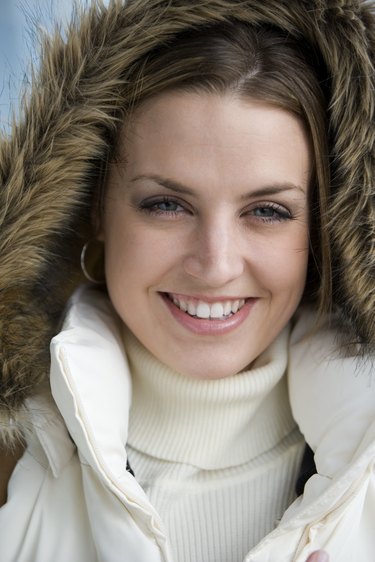Things You'll Need
Measuring tape
Faux fur fabric strip, at least 5 inches wide
Sewing machine (optional)
Thread
Sewing needle
Scissors
Chopstick or dowel
Pins

A fur or faux fur ruff added to the hood of a jacket gives added warmth and protection from the elements, as well as a stylish look. You can choose to go high end and use real fur to accent your jacket hood, but using faux fur fabric can give you a similar look for a lower cost. It can also be easier to work with than real fur. Adding a fur ruff to your coat or jacket can be done quickly with only a small amount of sewing knowledge.
Step 1
Measure the inside edge of your jacket's hood to determine the length of fur or faux fur fabric you will need. Add an additional inch to each end of the measurement for a seam allowance.
Video of the Day
Step 2
Measure and cut a strip of faux fur fabric that is at least 5 inches wide and the length you measured, with the additional seam allowance. For example, if your hood measured 24 inches from one seam to the other, you would need to cut a 26 inch long strip of fabric. If you want a wider fur ruff, then you'd want a wider strip of fabric. The finished ruff will be approximately half as wide as the initial piece.
Step 3
Fold the fabric in half lengthwise with the wrong side facing out. Sew the long edges together with a straight stitch, using either a sewing machine or a needle and thread. Leave 2 inches on both ends unsewn.
Step 4
Trim the ends of the sewn fur to a taper, with the point on the folded side. Turn the fabric tube so that the fur faces out using a chopstick or dowel to push the tube right side out. Pull out any fur that was caught in the seam with your fingers and fluff it up.
Step 5
Pin the faux fur tube to the hood so that the seam is flush against the hood's front edge. Pin the loose ends of the tube closed. The tapered ends of the tube should end at the seam that connects the hood to the rest of the garment.
Step 6
Sew the faux fur tube to the hood using a straight stitch along the line made by the pins. Sew the ends of the fur closed as well, and use extra passes to secure the corners to the hood. Tie off your thread and trim any excess threads.
Tip
Real fur ruffs can be purchased in a "ready-to-sew" state, eliminating the first four steps. This option is a faster project, but costs significantly more than the faux fur option.
Working with faux fur is very similar to working with real fur. Both can be very messy and should be petted while handling them. Both should be spot cleaned only. And a standard sewing machine can be used on both.
Different styles of faux fur will create different looks. A brightly colored, frizzy fur may be ideal for a young kid's hoodie, while a sleek mink replica will provide a more sophisticated look for a formal winter coat.
Take any leftover fur and make matching ruffs for your mittens, sleeve cuffs or the bottom edge of the coat.
Warning
Use care when sewing with sharp needles, as they can easily puncture your fingertips.
Video of the Day